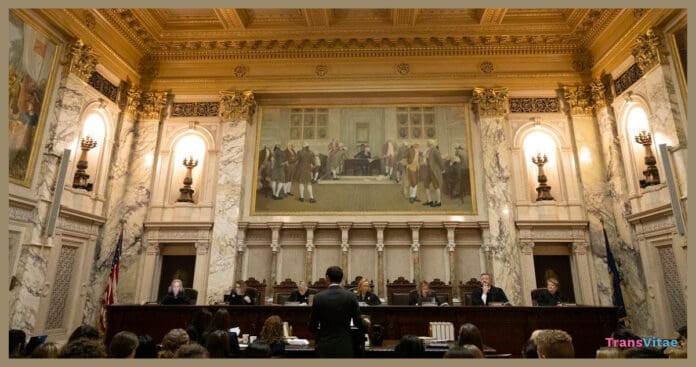A high-stakes battle is underway for control of the Wisconsin Supreme Court, a race that could shape the future of key issues affecting the state’s transgender community and other marginalized groups. With billionaire Elon Musk and a network of right-wing donors fueling the campaign of conservative candidate Brad Schimel, the outcome could determine the fate of abortion rights, union protections, and crucial election laws.
But beneath the headlines of big-money politics, transgender Wisconsinites and their allies are bracing for the real-world consequences of this election. The rhetoric and policies emerging from this race are part of a broader wave of attacks on transgender rights, including proposed laws targeting gender-affirming healthcare and school policies that affirm LGBTQ+ students.
Musk’s Influence and the Fight for Wisconsin’s Future
The conservative nonprofit Building America’s Future, backed by Musk, has poured $1.6 million into television ads supporting Schimel. This follows Musk’s public endorsement of Schimel on X (formerly Twitter) and his $250 million support for Donald Trump’s re-election campaign.
Schimel, a former Republican attorney general and now a Waukesha County judge, has made no secret of his alignment with Trump. He has openly welcomed the former president’s support, calling this judicial race “the most important in America in 2025.”
On the other side, Dane County Judge Susan Crawford, the liberal candidate in the race, is backed by the Wisconsin Democratic Party and advocacy groups such as Planned Parenthood Advocates of Wisconsin and Wisconsin’s AFL-CIO. Throughout her career, she has fought against restrictive abortion laws and for labor protections—stances that place her directly in opposition to Schimel.
Crawford has called out the influence of conservative billionaires, stating that Schimel is “bought and paid for by right-wing extremists” who seek to use the courts to roll back progress on fundamental rights.
Transgender Rights at the Center of the Debate
The stakes for transgender Wisconsinites are high. The Supreme Court’s ideological balance could determine whether protections for transgender individuals are upheld or dismantled. The court is expected to hear cases that could impact gender-affirming healthcare access, anti-discrimination protections, and school policies related to transgender students.
The campaign has already taken a dark turn with a series of anonymous text messages targeting transgender children. These messages, sent by an unregistered political group called “Win Wisconsin, Win the Future,” ask recipients if they believe parents should have the right to know if their child is transitioning at school. Though the texts do not explicitly endorse Schimel, the language mirrors right-wing talking points that have been used to justify restrictive laws nationwide.
Kate Mikkelsen, a Milwaukee parent of a transgender child, sees through the fearmongering tactics. “It’s interesting that they frame this as ‘parental rights,’” she said. “I wish to maintain my right as a parent to get my child the healthcare they need, with the guidance of medical professionals.”
Wisconsin Republicans Escalate Attacks on Transgender Rights
As the court race heats up, Wisconsin’s Republican-controlled Assembly has doubled down on anti-transgender legislation. In a heated debate last Thursday, lawmakers passed four bills restricting transgender rights—bills that Governor Tony Evers has promised to veto.
Among the most alarming proposals:
- A ban on trans youth in girls’ and women’s sports in K-12 schools and universities.
- A prohibition on gender-affirming medical care for minors, including puberty blockers and hormone therapy.
- A policy requiring parental permission for students to use different names or pronouns at school.
Assembly Speaker Robin Vos (R-Rochester) defended the measures, saying, “We are trying to protect the reality of biology.” However, opponents, including Rep. Angela Stroud (D-Ashland), called the bills “one of the most cynical pieces of legislation I can imagine.”
Transgender advocates and medical professionals have repeatedly emphasized that denying affirming care and identity recognition increases the risk of depression, anxiety, and suicide among trans youth. Rep. Lisa Subeck (D-Madison) reinforced this, stating, “These are decisions that should be made by doctors, patients, and families—not politicians.”
A National Flashpoint
The Wisconsin Supreme Court race is drawing nationwide attention as a bellwether for the political climate in 2025. While Musk and conservative billionaires pour money into Schimel’s campaign, progressive donors—including George Soros, Illinois Gov. JB Pritzker, and LinkedIn co-founder Reid Hoffman—are rallying behind Crawford.
With both sides preparing for a record-breaking $51 million election battle, the outcome will reverberate far beyond Wisconsin. If Schimel wins, conservatives will have a clear path to challenge policies protecting transgender rights, reproductive freedoms, and worker protections. If Crawford wins, the court will remain a safeguard against right-wing overreach.
The Bottom Line
For Wisconsin’s transgender community and their allies, this election isn’t just about who sits on the bench—it’s about whether their rights will be defended or dismantled. Voter turnout will be crucial in deciding the future of equality and justice in the state.
The Wisconsin Supreme Court election takes place on April 1, 2025. To protect transgender rights and ensure a more inclusive future, make your voice heard at the ballot box.


